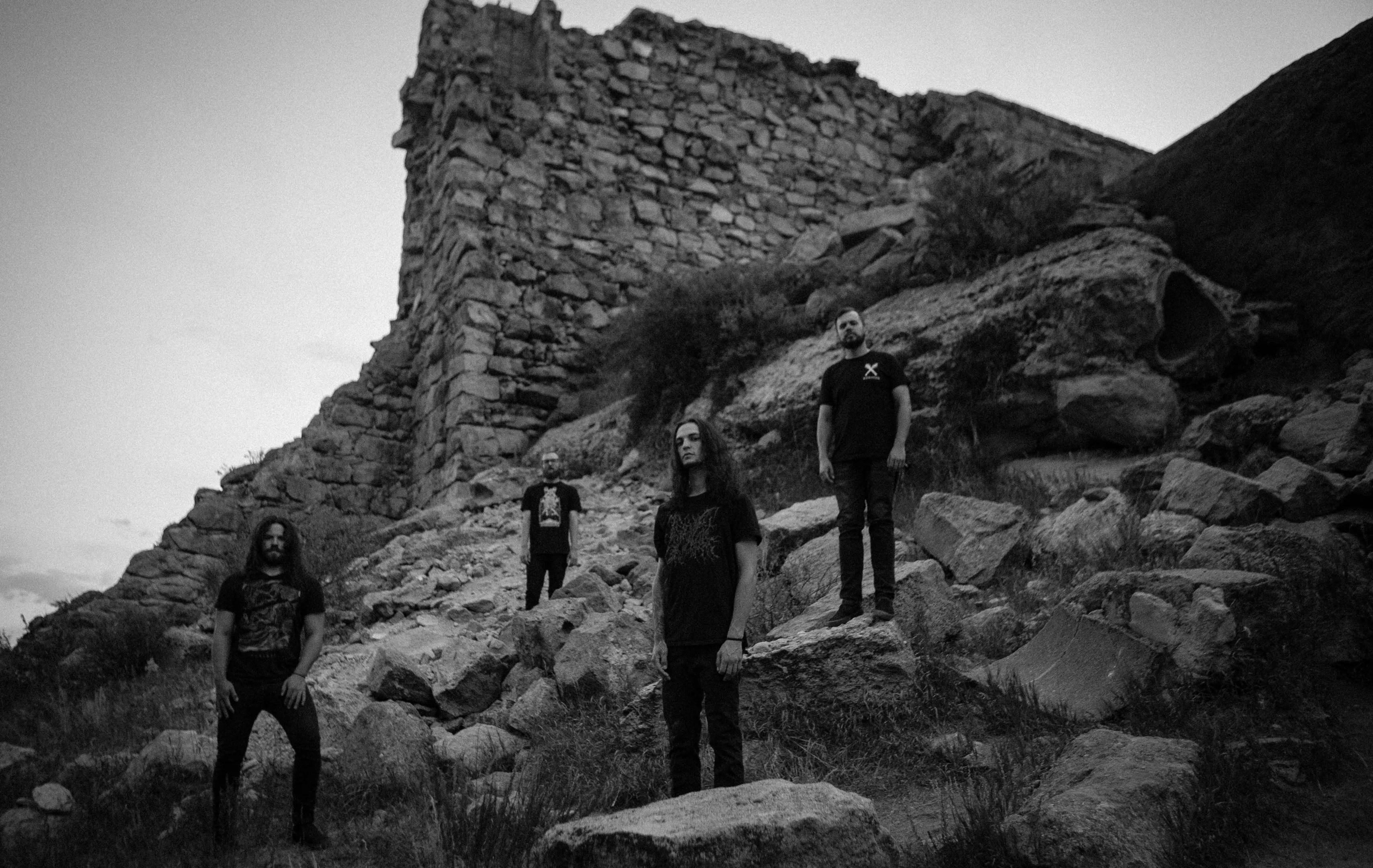
Alvino Salcedo

Audio By Carbonatix
Denver black-metal band Noctambulist straddles the line between technical proficiency, speed and a wall of sound that pulverizes listeners’ bones into jagged dust.
While the wall of sound may ring some bells, Noctambulist is no Grateful Dead. Nor is it Phish, or any of the other hippie capitalist bands that dominate the musical conversation around here. You will find no allegories to woke spiritual narcissism in Noctambulist’s sound. While the musical competence between black metal and jam bands is similar, and both styles’ vocals may be an acquired taste, the disparity between the two sounds can seem stark. The bohemian ethos is one of flowers in guns; the metal ethos is the gun.
As the first blackened note rings out from guitarist Andreas Tees’s guitar, an opal haze descends over your ears. Through its dust, Michael Nolan’s blistering snares and belt-fed toms create the fodder for the low end comprising Ryan Hunter’s pummeling bass and Nolan’s double kick drums. Then, piercing through its fog of war arises the assailing siren’s cry of singer Sean McConnell.
Ahead of Noctambulist’s gig at the hi-dive, we covered ourselves in holy water and said at least three Hail Marys before having a dispiriting conversation with the members of the band. Not one for idle chitchat, Noctambulist’s responses can be brief, but within its brevity, we covered the band’s thoughts on the Front Range’s prevailing music scene, how black metal thrives among it, the bands to look out for here, and which church in Denver should hypothetically be burned down.
Westword: What do you think of the Grateful Dead?
McConnell: Uninspired, redundant dreck.
Tee: Love ’em.
Nolan: Not my thing.
Hunter: They haven’t interested me enough to have an opinion, but a friend of mine is a fan. He told me someone put together an album from all the noise between their songs during shows, which sounds interesting.
What about dubstep?
McConnell: I love a lot of electronic music, just not a ton of dubstep.
Tee: That’s still a thing?
Nolan: It’s a style of music I don’t listen to or care for, so I can’t speak on it.
Hunter: Dubstep was never for me, but I was listening to Aphex Twin last night, which I’m pretty sure influenced some of the dubstep pioneers.
How do you think black metal fits into the prevailing musical culture here? Do you see unexpected crossovers in microcultures?
McConnell: I think because Denver has become a metal hotspot in the past ten years or so, people assume it wasn’t a thing before. I’ve been playing metal in Denver since 2007. There was never a shortage of bands, and no trends and subgenres missed Denver. Extreme music is constantly evolving and has an influence on more scenes than you would think. Headbanging is a staple at most dubstep shows, after all.
Tee: Death/black metal has always been here. Cephalic Carnage started in the ’90s, Dethroned, Excommunion, Nightbringer and Execration were some of the best death and black metal bands around here in the ’00s, and the 2010s saw an explosion of amazing bands that put Denver on the map for heavy music. I don’t think the metal scene here bleeds into other scenes, really, but you’ll definitely see me at some bluegrass, reggae and country shows from time to time.
Hunter: I don’t think black metal or any extreme music is supposed to fit into the prevailing culture anywhere, it’s counterculture. Even though it’s become more widely accepted, the same crossovers between musical subcultures have been in Denver the whole time I’ve been going to shows.
Can you tell us a little bit about your understanding of the death and black metal scene here?
Hunter: My first black- and death-metal bands started in 2010, and the Denver scene was around before then, so it’s been around a while. During that time, though, grind was kind of the most “in-style” genre for extreme music. Clinging to the Trees of a Forest Fire was a big player in putting Denver on the map, and later became Vermin Womb and Primitive Man. Some notable grind was Roskopp, Catheter, Aberrant and No Thought.
Death metal has made a comeback within the past five to seven years, though. In general, we help each other out. The vocalist of Limbwrecker just printed some shirts for us, for example. There’s also a luthier we go to in one of the bands, as well as an amp tech and a few people that handle most of the booking in the area.
Where do black-metal bands usually play, what are the crowds like, and what other bands are making waves?
Hunter: In 2010, it was a lot of backyards, living rooms, basements and dive bars. Hi-dive, Mutiny Information Cafe, Larimer Lounge, Marquis, 3 Kings and Lost Lake have been hosting heavy bands pretty much the whole time, but now some locals have been headlining the Bluebird, and the Oriental has started doing stuff, too. Ghosts of Glaciers, Of Feather and Bone, and Oryx are making waves. Convulse Records is doing good stuff for hardcore, too, which is adjacent. For the crowds, I guess people will just have to check it out and preferably show up for openers.
How have your vocal cords not ruptured?
McConnell: Tea, honey and warmups don’t hurt. Mostly, it’s just being pissed.
Hypothetically, if you were to burn a church down in Denver, and only one church, which one would you choose? Any particular reason, you know, hypothetically?
Nolan: None. Although I’d burn down the Westboro Baptist Church and all that hate within those walls.
Hunter: Maybe the one in Castle Rock that had a get-together to discuss hanging election officials.
Noctambulist supports Sunless, Friday, April 8, at the hi-dive, 7 South Broadway. Tickets are $15.